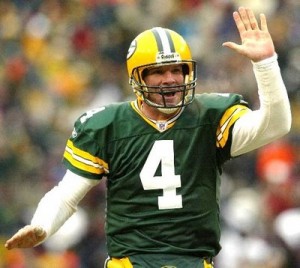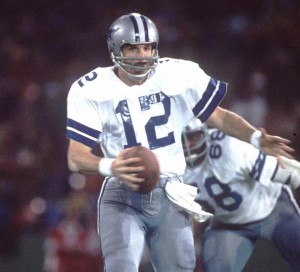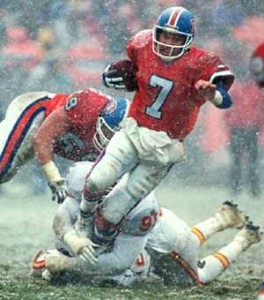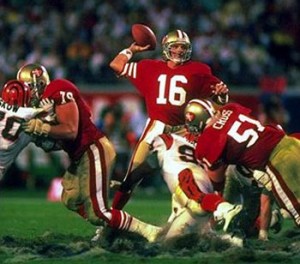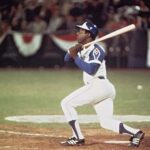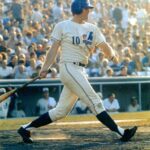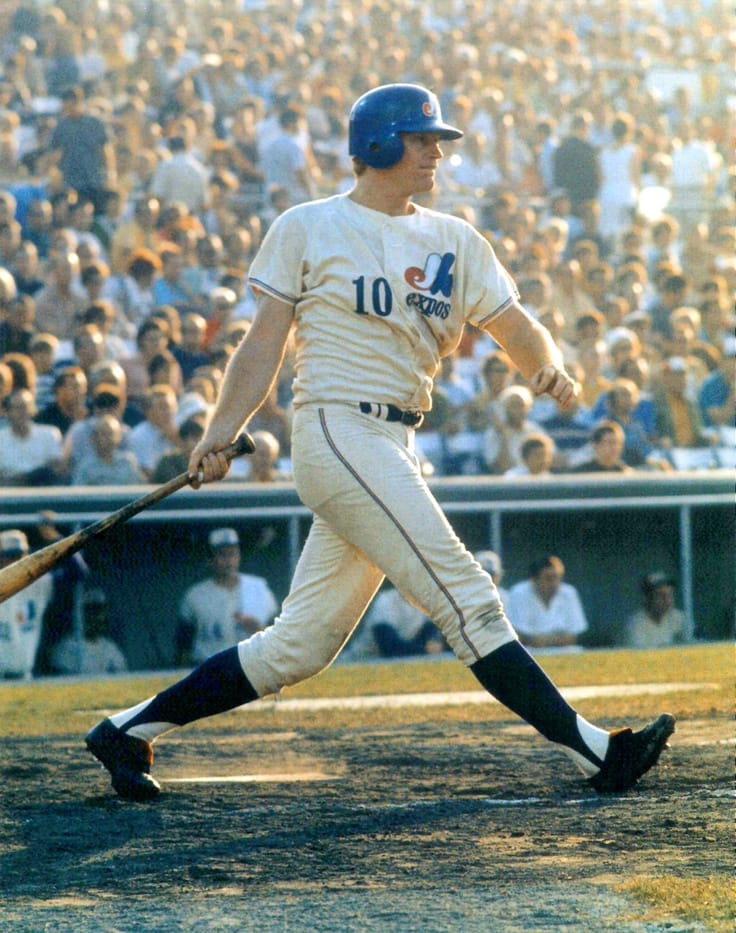Best Quarterbacks in NFL History: Where Does Favre Rank?
Now that it appears Brett Favre’s 20-year NFL career is finally in its last stages, it provides an opportunity to analyze where the gunslinger ranks among the best quarterbacks in NFL history.
There have been many superstar quarterbacks who fall short when selecting the all-time greats because while they may have posted excellent career numbers, they never measurably made their team better.
The best quarterbacks make an average team good, a good team great and a great team into a champion.
Trying to analyze the value Favre brought to the Packers and recently to the Jets and Vikings can be challenging. Given his tendency for risk taking and the subsequent risk-reward results, did Favre make average teams perform at a higher level than they would have otherwise or did he make key mistakes at inopportune times that kept great Packer and Vikings teams from going as far as they maybe would have had he not been such a gunslinger?
During his 19 years as a starting quarterback, Favre has led his team to at least eight victories 17 times and to double digit win totals 10 times. However, Favre has a 2-3 record in NFC Championship Games and late interceptions cost his team in each of his last two trips to the conference title game.
Favre will retire as the NFL’s all-time leader in passing yards, pass attempts, pass completions, touchdown passes, passes intercepted and times sacked. However, he ranks only 17th in completion percentage and 21st in passer rating. So, it is sometimes difficult to distinguish between how great he has been and how many of his records are purely a result of his longevity.
Since the game of football and the quarterback position have evolved so dramatically from the early days of the NFL, for the purpose of creating this list, I have included quarterbacks whose primary careers occurred after 1955. There is no question that Sammy Baugh, Otto Graham and Sid Luckman deserve to be recognized as among the best quarterbacks of all-time, but to try and thoughtfully compare their careers to those of today’s stars in virtually impossible.
Because quarterback stats have increased so dramatically even during the last 55 years, using just single season or career stats to analyze all-time greatness isn’t really an accurate assessment of where a player ranks among the best of all-time. Other qualities such as team success, comparison to others from that particular era and quality of the skill position players around the quarterback also can be used to chronicle success.
Below is my take on the top 10 quarterbacks in NFL history. In general, the selections are not significantly different than those listed in many other all-time quarterback lists. Rather, there are some differences in my order than on other lists. If you have an opinion, please feel free to provide your own top 10.
Who is the Best Quarterback in NFL History?
- Joe Montana (32%, 136 Votes)
- Tom Brady (14%, 59 Votes)
- Johnny Unitas (11%, 46 Votes)
- Brett Favre (11%, 46 Votes)
- Peyton Manning (9%, 38 Votes)
- John Elway (7%, 30 Votes)
- Dan Marino (6%, 26 Votes)
- Roger Staubach (6%, 24 Votes)
- Bart Starr (4%, 19 Votes)
- Dan Fouts (1%, 3 Votes)
Total Voters: 427
10. Bart Starr – Greatness at the quarterback position can best be illustrated by the decisions made with the game on the line. During the era when quarterbacks called their own plays and were truly the coach on the field, no quarterback was better at making the right decision in a big moment than Bart Starr. Starr led the Green Bay Packers to six NFL Championship Games and five times the Packers were victorious. He was named the MVP of each of the first two Super Bowls. Starr’s statistics don’t necessarily compare to the other top quarterbacks in NFL history, but part of the reason for that was the era in which he played and also that he played on a team that was balanced between the run and pass. Starr never threw more than 295 passes in a season and his career-high for touchdown passes in a season was 16. At the time of his retirement, Starr’s 57.4% career completion percentage was the best in NFL history and he was fourth in the first 50 years of the NFL with his 80.5 quarterback rating.
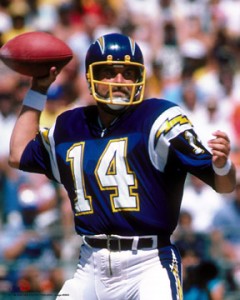
Dan Fouts was the first quarterback in NFL history to pass for 4,000 yards in a season more than once.
9. Dan Fouts – In 1978 the NFL changed a number of rules with the goal of opening up the offense. No quarterback initially benefited more from those changes than Dan Fouts of the San Diego Chargers. After struggling to establish himself as a full-time NFL starter during his first five NFL seasons, Fouts passed for 2,999 yards and 24 touchdowns in 1978 and then led the NFL in passing yards in each of the next four seasons. Before Fouts, only Joe Namath with a 4,007 season in 1967 had passed for more than 4,000 yards in a season. Fouts eclipsed that mark three straight seasons, including a record 4,802 yards with 33 touchdowns in 1981. At the conclusion of that season, Fouts and the Chargers lost in the AFC Championship Game for the second straight year. Fouts would not come any closer to reaching the Super Bowl and that is why he isn’t higher on the top ten list.
8. Dan Marino – Before Brett Favre, it was Dan Marino who held most of the NFL’s major career passing records. In 1984, Marino had perhaps the finest individual season by a quarterback in league history when he set single season records with 48 touchdown passes and 5,084 passing yards. For over a decade, Marino was always among the league leaders in all passing statistics. Part of the reason for that was the consistent inability of the Dolphins to develop a comparable running attack to compliment Marino and the passing game. This deficiency probably helped bolster Marino’s stats, but also made his production all the more impressive because opponents knew what was coming. The only reason Marino isn’t higher on this list is that he was never able to win a Super Bowl. Marino’s only trip to the Super Bowl occurred following that 1984 season, but the Dolphins were unable to match Joe Montana and the San Francisco 49ers.
7. Brett Favre – When the definitive history about Favre is written it will certainly mention his illustrious statistics, but what will probably be the greatest lasting legacy of Favre is his toughness and durability. No player, much less a quarterback, has ever started more consecutive games than the 297 straight started by Favre before the streak ended when he was 41 years old. Because of his brash style and gunslinger mentality, Favre wasn’t always great, but he always left everything he had on the football field. His negative plays and ability to win only one championship keeps Favre out of the top five, but Favre is unquestionably one of the best quarterbacks in NFL history.
6. Roger Staubach – If career statistics were the only measurement of greatness, then “Roger the Dodger” would not be considered one of the 10 best quarterbacks of all-time. However, regardless of the generation during which they played, the greatest statistic for a quarterback is in the win-loss column and few quarterbacks were as successful in making the big play needed to secure a victory than Staubach. Long before John Elway and Joe Montana became known for late game comebacks, Staubach was regularly pulling out last minute victories that helped Dallas make the playoffs eight times, reach the Super Bowl four times and win two Super Bowl titles in his nine seasons as a starting quarterback. What made Staubach so challenging for defenses was that he was able to win with both his arm and also his legs. He averaged 5.5 yards rushing per carry during his career with 2,264 yards and 20 rushing touchdowns. At the time of his retirement, Staubach ranked 1st in NFL history in passer rating.
5. Peyton Manning – If you are looking for the prototypical quarterback of the early 21st Century, you need look no further than Peyton Manning. He combines the statistical accumulation of Marino and Favre with the toughness and winning desire of Staubach, Unitas, Elway and Montana. The Colts have reached the playoffs 10 times during his first 12 seasons and between 2003 and 2009 registered an amazing streak of seven straight seasons with 12 or more victories. Even this season with his running game depleted and most of his receivers injured, Manning has secured a winning year for the Colts and has them on the brink of another playoff campaign. The only reason Manning isn’t higher on the list is that he has struggled to defeat the squad quarterbacked by the number four quarterback on this list.
4. Tom Brady – It is often the tendency in the sports world to compare athletes to others who have come before them. Because of his cool demeanor on the field and ability to lead his team to big victories, Tom Brady has often been compared to former 49ers superstar Joe Montana. Neither Brady (6th round pick) nor Montana (3rd round) was highly regarded after solid college careers, but you can’t measure killer instinct at the combine and both players demonstrated a calculated passion that helped turn their very good teams into Super Bowl Champions. Brady enjoyed an MVP season in 2007 when he tossed a record 50 touchdowns to lead the Patriots to an undefeated season. He is having perhaps an even better campaign in 2010 as he has led a New England team that many thought would struggle to the best record in the AFC.
3. John Elway – For most of his career, it looked like John Elway would join Dan Fouts, Sonny Jurgenson, Warren Moon, Fran Tarkenton, Jim Kelly and Dan Marino as Hall of Fame caliber quarterbacks who never were able to lead their team to a Super Bowl title. Three times during the 1980s Elway led good Denver Broncos teams to the Super Bowl, but each time they were defeated by a better all-around team. Elway continued to build his Hall of Fame resume into the 1990s, but it wasn’t until 1997 that the Broncos put it all together and returned to the Super Bowl. Though they were facing Brett Favre and the defending champion Packers, this time Elway wouldn’t be denied. Proving that their victory wasn’t a fluke, the Broncos won the Super Bowl again the following year and Elway retired as a champion.
2. Johnny Unitas – Serving as the bridge from the early NFL quarterbacks to the modern era, Johnny Unitas went from sandlot football player to Hall of Fame champion. During a time when quarterbacks were not protected like fine china, Unitas displayed a toughness that earned the respect of everyone who lined up against him. He led the Colts to both the tying and winning drives in the 1958 NFL Championship Game and the Colts repeated again the following season. More than a decade later, he led the Colts to a Super Bowl title. In between, Unitas compiled statistics that were unprecedented for his era including 40,239 career passing yards, 290 touchdown passes and a streak of 47 consecutive games with at least one touchdown pass.
1. Joe Montana – Because the San Francisco 49ers won four Super Bowl titles and made nine playoff appearances between 1981 and 1990 it is often assumed that they were the most talented team in football throughout that period. Surprisingly, that was not the case as the roster was often filled with players who had been cast off by other teams or who were selected in the lower rounds of the NFL draft. It was perfect that the quarterback of these teams was a third round selection that despite leading his college team to the national title few believed could be a great NFL quarterback. But Joe Montana proved to be the perfect fit for the system of Hall of Fame coach Bill Walsh and together the two made magic. Montana was statistically one of the best quarterbacks of his era, but it was when the game was on the line that Montana was at his best. A three-time Super Bowl MVP, Montana compiled a 16-7 record as a starting quarterback in the playoffs and didn’t throw an interception in any of his Super Bowl appearances.
He also led the 49ers on the game winning drive to defeat the Cincinnati Bengals in Super Bowl XXIII.
It speaks to the hit-or-miss aspect of scouting that just three of the 10 players on this list were selected in the first round of the NFL Draft with two of those picks, Manning and Elway, being chosen with the first overall pick. Brett Favre was chosen in the second round with Montana and Fouts picked in the third round and all the others selected in the fourth round or later.
There are obviously several all-time greats who could very easily have made this list of top quarterbacks. Among those who just missed the cut were Warren Moon, Troy Aikman, Jim Kelly, Len Dawson, Terry Bradshaw, Randall Cunningham, Fran Tarkenton, Ken Stabler, Drew Brees and Steve Young. An argument could definitely be made for putting each one of those players on the list, but at the end of the day their overall body of work fell just short of the top 10.
